Navigating the mortgage world is not an easy task, especially if the basic knowledge of this industry is unknown. Most first time homebuyers are unaware of the options they have available to them when shopping for a home loan. As a result, homebuyers don’t understand the requirements needed to qualify for the different programs and incentives and could lose out on potential savings.
Types of Home Mortgage Loans
Making the decision to purchase a home can be terrifying, but knowledge can ease the decision making process you are about to embark on. When looking for home loans, the three most common loan types are First Time Homebuyer (more commonly known as the FHA), the Veteran Affairs loan (more commonly known as the VA loan), and a Conventional loan. Each loan type can provide homebuyers with unique savings or terms to fit your financial situation. Lets take a more in-depth look at each type of loan.
FHA Loans
FHA loans have been helping people become homeowners since 1934. How do they do it? The Federal Housing Administration (FHA) - which is part of HUD - insures the loan, so your lender can offer you a better deal on a wide rage of available housing.
Low Down Payments - Your down payment can be as low as 3.5% of the purchase price. Available on 1-4 unit properties. FHA home loan minimum standards requires a FICO score of 580 or higher to qualify for the lowest down payment offered.
Low Closing Costs - FHA loans allow sellers to cover closing costs up to six percent of the purchase price. That can mean lender’s fees, property taxes, homeowners insurance, escrow fees, and title insurance.
Mortgage Insurance Premium (MIP) - FHA requires an upfront mortgage insurance premium (MIP) of 1.75 percent of the loan amount. However, most borrowers wrap that charge into their loan amount.
Easy Credit Qualifications - FHA loan applicants are now required to have a minimum FICO score of 580 to qualify for the low down payment advantage, which is currently at around 3.5 percent. If your credit score is below 580, however, you will have to put down a 10 percent payment to qualify for a loan.
No Credit or Bankruptcy/Foreclosure - The FHA usually requires two lines of credit for qualifying applicants. If you don't have a sufficient credit history, you can try to qualify through a substitute form. Just because you've filed for bankruptcy or suffered a foreclosure in the past few years doesn't mean you're excluded from qualifying for an FHA loan. As long as you meet other requirements that satisfy the FHA, such as re-establishment of good credit, solid payment history, etc., you can still qualify.
Veteran Affairs (VA) Loan
The VA helps Servicemembers, Veterans, and eligible surviving spouses become homeowners. They provide a home loan guaranty benefit and other housing-related programs to help you buy, build, repair, retain, or adapt a home for your own personal occupancy.
VA Home Loans are provided by private lenders, such as banks and mortgage companies. The VA guarantees a portion of the loan, enabling the lender to provide you with more favorable terms.
No Down Payment - Most home loan programs require you to make at least a small down payment to buy a home. The VA home loan is an exception. Rather than paying 5, 10, 20 percent or more of the home’s purchase price upfront in cash, with a VA loan you can finance up to 100 percent of the purchase price. The VA loan is a true no-money-down home mortgage opportunity.
No Mortgage Insurance Requirements - Typically, lenders require you to pay for mortgage insurance if you make a down payment that’s less than 20 percent. VA loans require neither a down payment nor mortgage insurance. That makes a VA-backed mortgage very affordable upfront and over time.
Mortgage Variety - A VA loan can have a fixed rate or an adjustable rate. In addition, you can use a VA loan to buy a house, condo, new-built home, manufactured home, duplex or other types of properties. The choice is yours. A VA-approved lender can help you decide.
Eligibility Qualification - VA loans require specific documentation, an acceptable credit history, and sufficient income to make your monthly payments. Your length of service or service commitment, duty status and character of service determine your eligibility for specific home loan benefits.
CONVENTIONAL HOME LOAN
Conventional mortgages aren't federally guaranteed. Qualifying for a conventional loan can be tougher than with government loans, but the options fit a wider range of buyers and properties. Conventional loans are often the best option for borrowers with strong credit who can contribute a down payment of at least 3%, or perhaps quite a bit more.
Two Categories: Conforming and Non-Conforming - Conforming loans follow the guidelines set by Fannie Mae and Freddie Mac. Many nonconforming loans are jumbo loans, which are for home buyers who need to borrow an amount that's higher than the conforming limit for the area. Other types of nonconforming loans include those made to borrowers with poor credit, high debt or recent bankruptcy, or on homes with a high loan-to-value ratio (usually up to 90% for a conforming loan).
Mortgage Insurance Control - If your down payment on a conventional loan is less than 20%, you'll have to get private mortgage insurance. After your principal loan balance drops to 78% of the home’s value, however, you can ask to cancel your PMI.
No Program-Specific Fees - With conventional loans you don't have the additional program-specific costs of government-backed loans. For example, with an FHA loan you'll pay a 1.75% upfront mortgage insurance premium; VA loans have a funding fee of 1.4 to 2.3%, depending on your down payment.
More Loan Structure Choices - Though 30-year fixed-rate conventional mortgages are the most common, you can find other terms (like 15- or 20-year loans) as well as adjustable-rate mortgages. Since lenders don't have to stick to government-prescribed programs, they can create more options.
Credit scores for home loans
Credit scores can be a confusing topic for even the most financially savvy consumers. Most people understand that a good credit score boosts your chances of qualifying for a mortgage because it shows the lender you’re likely to repay your loan on time.
But do you know the minimum credit score you need to qualify for a mortgage and buy a house? And did you know that this minimum will vary depending on what type of mortgage you are seeking?
The Importance Of FICO®
One of the most common scores used by mortgage lenders to determine credit worthiness is the FICO® Score (created by the Fair Isaac Corporation). While your FICO® Score plays a big role in the mortgage process, lenders do look at several factors, including your income, property type, assets and debt levels, to determine whether to approve you for a loan.
Minimum Credit Score By Mortgage Loan Type
The minimum credit score you need to qualify for a mortgage in 2021 depends on the type of mortgage you’re trying to obtain. Scores differ whether you’re applying for a loan insured by the Federal Housing Administration, better known as an FHA loan; one insured by the U.S. Department of Veterans Affairs, known as a VA loan; or a conventional mortgage loan from a private lender:
Conventional: Minimum FICO score of 620
FHA (3.5% down): Minimum FICO score of 580, but lenders require a score of 620
FHA (10% down): Minimum FICO score of 500, but lenders require a score of 620
VA Loan: No minimum FICO score required, but lenders require a score of at least 620
It’s important to know your credit score and understand what affects it before you begin the mortgage process. Once you understand this information, you can begin to positively impact your credit score or maintain it so you can give yourself the best chance of qualifying for a mortgage.
Your credit score is based on the following factors: Payment history (35%), Amount owed (30%), Length of credit history (15%), Types of credit (10%), and New credit (10%).
What Else Do Mortgage Lenders Consider?
Your credit score is a key factor in determining whether you qualify for a mortgage, but it’s not the only factor lenders consider. Lenders will assess all of your income sources and monthly debts to figure out what mortgage you can afford and have the ability to pay back.
Income: Lenders will also look at your income. They want to make sure you make enough money each month to afford your payments.
Debt-To-Income Ratio: Lenders also look at your monthly debts. Lenders vary, but they generally want your total monthly debts, including your estimated new mortgage payment, to consume no more than 43% of your gross monthly income. If your debt-to-income ratio is higher, you might struggle to qualify for a mortgage.
Savings: Lenders want to make sure that you have funds available to make your mortgage payment if your income should unexpectedly dry up. Because of this, most will want to see that you have enough money saved to cover at least two months of mortgage payments.
Employment History: Lenders vary, but they usually like to see that you’ve worked at the same job, or at least in the same industry, for at least 2 years. They believe you’re less likely to lose that job, and that stream of income, if you’ve built up a longer work history.
Nabil Dajani
Movement Mortgage
Whether you’re buying, selling, refinancing, or building your dream home, you have a lot riding on your loan officer. Since market conditions and mortgage programs change frequently, you need to make sure you’re dealing with a top professional who is able to give you quick and accurate financial advice. As an experienced loan officer, Nabil has the knowledge and expertise you need to explore the many financing options available.











